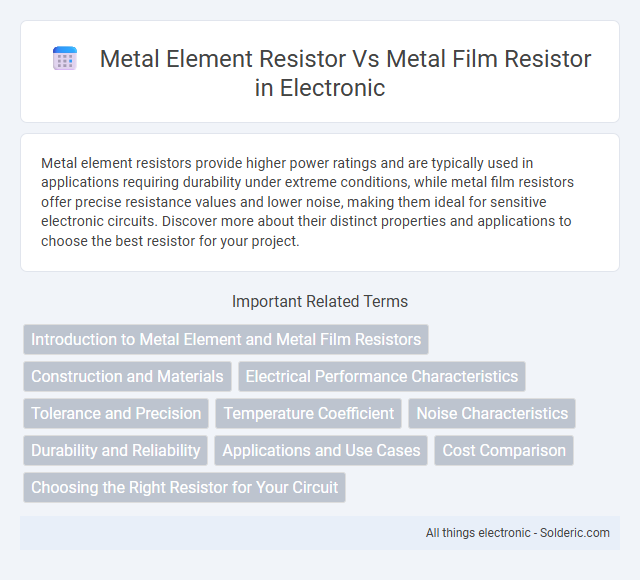Metal element resistors provide higher power ratings and are typically used in applications requiring durability under extreme conditions, while metal film resistors offer precise resistance values and lower noise, making them ideal for sensitive electronic circuits. Discover more about their distinct properties and applications to choose the best resistor for your project.
Comparison Table
| Feature | Metal Element Resistor | Metal Film Resistor |
|---|---|---|
| Construction | Coiled metal wire on ceramic core | Thin metal film deposited on ceramic substrate |
| Resistance Tolerance | +-5% to +-20% | +-1% to +-5% |
| Noise Level | Higher noise due to wire coil | Low noise performance |
| Temperature Coefficient | Higher TCR (around +-200 ppm/degC) | Lower TCR (as low as +-50 ppm/degC) |
| Power Rating | Typically 0.25W to 2W | Typically 0.1W to 1W |
| Stability and Reliability | Less stable, prone to drift over time | More stable with long-term reliability |
| Applications | High power, pulse, or surge applications | Precision circuitry, low noise requirements |
| Cost | Generally lower cost | Higher cost due to precision |
Introduction to Metal Element and Metal Film Resistors
Metal element resistors use a wire coil made from a metal alloy to provide resistance, known for handling high power and withstanding temperature variations. Metal film resistors consist of a thin metal layer deposited onto a ceramic substrate, offering high precision, low noise, and better stability over time. Your choice depends on whether you prioritize durability and power capacity or accuracy and noise reduction in your electronic circuits.
Construction and Materials
Metal element resistors are constructed using a metal wire or metal alloy element wound around an insulating core, providing high power dissipation and stability in harsh environments. Metal film resistors consist of a thin metallic film deposited on a ceramic substrate, which offers superior precision, low noise, and tighter tolerance compared to metal element types. Your choice depends on whether you prioritize power handling (metal element) or accuracy and noise performance (metal film).
Electrical Performance Characteristics
Metal film resistors exhibit superior electrical performance compared to metal element resistors due to their lower noise levels and tighter tolerance ranges, typically +-1% or better. They offer enhanced stability and temperature coefficient ratings often around 50 ppm/degC, resulting in more predictable resistance changes under varying environmental conditions. Metal element resistors, while generally robust, have higher noise and wider tolerance, making metal film resistors preferable for precision electronic applications.
Tolerance and Precision
Metal film resistors offer superior tolerance and precision compared to metal element resistors, with typical tolerances as low as +-1% or better, while metal element resistors often have wider tolerances around +-5%. The metal film construction provides a more stable resistance value over temperature changes and time, making them ideal for applications requiring consistent performance. When selecting resistors for your circuit, choosing metal film resistors enhances accuracy and reliability in sensitive electronic designs.
Temperature Coefficient
Metal film resistors offer a significantly lower Temperature Coefficient of Resistance (TCR) compared to metal element resistors, typically around +-25 ppm/degC versus +-200 ppm/degC or higher for metal element types. This improved TCR in metal film resistors ensures greater stability and accuracy in circuits experiencing temperature fluctuations. Your choice of resistor directly impacts performance in temperature-sensitive applications, with metal film resistors providing superior reliability.
Noise Characteristics
Metal film resistors exhibit lower noise levels compared to metal element resistors due to their uniform resistive film, which ensures minimal random fluctuations. Metal element resistors tend to produce higher noise because of structural inconsistencies and grain boundaries within the metal wire. Your choice should favor metal film resistors for applications requiring precision and minimal electrical noise interference.
Durability and Reliability
Metal film resistors offer superior durability and reliability compared to metal element resistors, due to their precise manufacturing process and stable metal oxide films. These resistors maintain resistance values accurately under temperature fluctuations, mechanical stress, and long-term use, reducing failure risk in critical circuits. You can expect enhanced performance in demanding electronic applications when choosing metal film resistors for their consistent reliability.
Applications and Use Cases
Metal element resistors are commonly used in high-power applications, such as power supplies, motor controls, and industrial equipment, due to their ability to handle high temperatures and dissipate significant heat. Metal film resistors find extensive use in precision electronic circuits, including audio equipment, instrumentation, and measurement devices, where low noise and high stability are critical. Both types serve important roles in circuit design, but metal film resistors excel in applications requiring accuracy and reliability.
Cost Comparison
Metal film resistors generally have higher manufacturing costs due to their precise film deposition process, leading to better tolerance and stability compared to metal element resistors. Metal element resistors are typically less expensive because their construction involves simpler, bulk metal wire or strip components. The cost difference becomes more significant in high-precision or high-volume applications where performance requirements favor metal film technology.
Choosing the Right Resistor for Your Circuit
Metal film resistors offer superior precision, low noise, and better temperature stability compared to metal element resistors, making them ideal for high-performance and sensitive electronic circuits. Metal element resistors, while typically more robust and cost-effective, exhibit higher tolerance and noise levels, suitable for general-purpose applications where exact resistance is less critical. Selecting the right resistor depends on the circuit's requirements for accuracy, stability, and environmental conditions, with metal film resistors favored in precision designs and metal element resistors chosen for durability and budget constraints.
Metal element resistor vs metal film resistor Infographic

 solderic.com
solderic.com